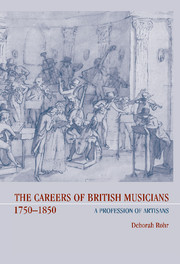Book contents
- Frontmatter
- Contents
- List of tables
- Acknowledgments
- List of abbreviations
- Introduction
- 1 The social and professional status of musicians in the eighteenth century
- 2 Social profile
- 3 Patronage
- 4 Musical education
- 5 Church musicians
- 6 Secular musicians: singers
- 7 Secular musicians: instrumentalists
- 8 Teachers, composers, and entrepreneurs
- 9 The fortunes of musicians
- 10 The struggle for social and professional status
- Epilogue
- Appendix
- Notes
- Bibliography
- Index
5 - Church musicians
Published online by Cambridge University Press: 20 October 2009
- Frontmatter
- Contents
- List of tables
- Acknowledgments
- List of abbreviations
- Introduction
- 1 The social and professional status of musicians in the eighteenth century
- 2 Social profile
- 3 Patronage
- 4 Musical education
- 5 Church musicians
- 6 Secular musicians: singers
- 7 Secular musicians: instrumentalists
- 8 Teachers, composers, and entrepreneurs
- 9 The fortunes of musicians
- 10 The struggle for social and professional status
- Epilogue
- Appendix
- Notes
- Bibliography
- Index
Summary
The evolution of careers in church music was closely intertwined with the history of the Anglican Church, which experienced its own upheavals and transitions during this period. There has been much debate in recent years about the role of religion and the church in eighteenth-century British thought and society; many scholars now question the traditional view of eighteenth-century Britain as an increasingly secular society, noting instead the degree to which religious ideals and concerns continued to pervade most aspects of the culture. Recent studies have also tempered the notion of a radical contrast between the neglect and decay of the eighteenth-century church and the debates and reforms of the nineteenth-century Oxford movement. Despite these important revisions, however, the condition of church music and musicians in the eighteenth century lends support to the view that in at least some respects the church experienced a period of decline.
Church musicians enjoyed a number of advantages not shared by their secular colleagues: membership in the traditional, high-status branch of the profession linked to the cathedrals and universities; relative freedom from association with cultural anxieties about gender, foreigners, and immorality (women were largely excluded and foreigners unlikely); and connection with the long and esteemed history of a distinctly English tradition of church music.
- Type
- Chapter
- Information
- The Careers of British Musicians, 1750–1850A Profession of Artisans, pp. 86 - 99Publisher: Cambridge University PressPrint publication year: 2001



